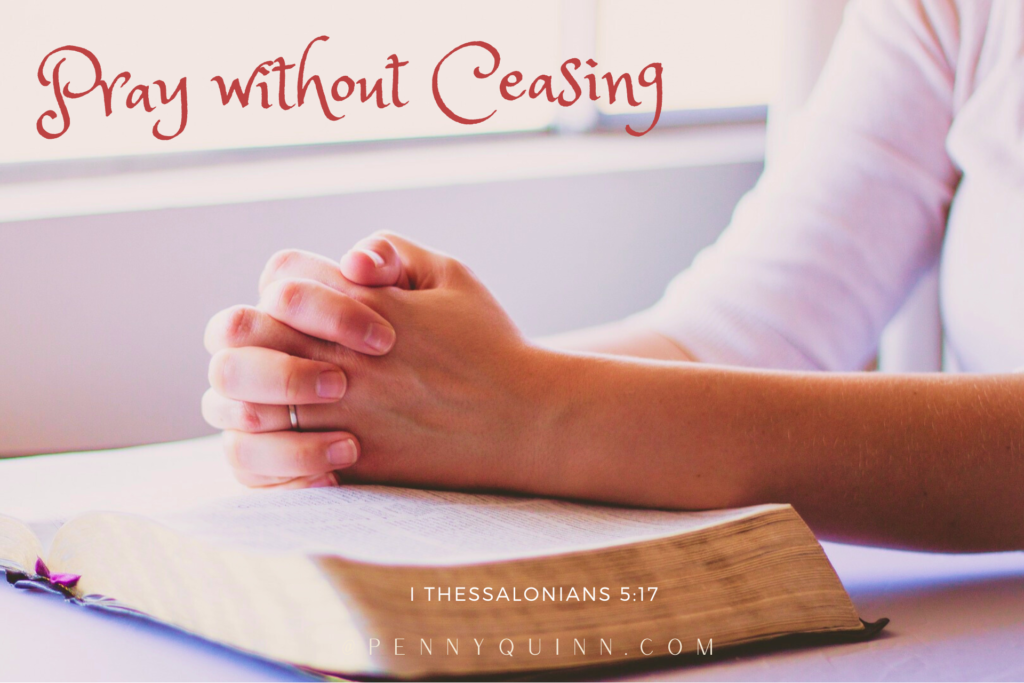The story of Abraham and Lot and the difference in their relationships with God, made me think how building an intimate relationship with God can give us the boldness to ask Him anything in prayer. Abraham’s intimacy with God, always following closely His instructions was the reason he could implore God to save Lot and his family before destroying the sinful Sodom. Abraham intercedes for Lot and Sodom, when God informs Him of His plan to destroy Sodom.
To intercede means to use one’s influence to persuade someone in authority to forgive a person, or to save that person from punishment.
We read in Genesis 18:16- “Then the men left and went to a place where they could look down at Sodom, and Abraham went with them to send them on their way. And the Lord said to himself,“ I will not hide from Abraham what I am going to do. Then the Lord said to Abraham, “There are terrible accusations against Sodom and Gomorrah, and their sin is very great. I must go down to find out whether or not the accusations which I have heard are true.” Then the two men left and went on toward Sodom, but the Lord remained with Abraham.
Abraham approached the Lord and asked, “Are you really going to destroy the innocent with the guilty? If there are fifty innocent people in the city, will you destroy the whole city? Won’t you spare it in order to save the fifty? Surely you won’t kill the innocent with the guilty. That’s impossible! You can’t do that. If you did, the innocent would be punished along with the guilty. That is impossible. The judge of all the earth has to act justly.”
The Lord answered, “If I find fifty innocent people in Sodom, I will spare the whole city for their sake.” Abraham spoke again: “Please forgive my boldness in continuing to speak to you, Lord. I am only a man and have no right to say anything. But perhaps there will be only forty-five innocent people instead of fifty. Will you destroy the whole city because there are five too few?” The Lord answered, “I will not destroy the city if I find forty-five innocent people.” Abraham spoke again: “Perhaps there will be only forty.” He replied, “I will not destroy it if there are forty.” Abraham said, “Please don’t be angry, Lord, but I must speak again. What if there are only thirty?” He said, “I will not do it if I find thirty.” Abraham said, “Please forgive my boldness in continuing to speak to you, Lord. Suppose that only twenty are found?” He said, “I will not destroy the city if I find twenty.” Abraham said, “Please don’t be angry, Lord, and I will speak only once more. What if only ten are found?” He said, “I will not destroy it if there are ten.” After he had finished speaking with Abraham, the Lord went away, and Abraham returned home.”
Lessons we can learn from this encounter:
Firstly, God is willing to spare cities – although Sodom was wicked and corrupt and God had had enough of their unrighteous living, he was willing to save the city if He found ten righteous people. God is willing to spare cities where believers are praying and interceding for the people.
Secondly, there is power in intercession – When Abraham saw that God was determined to destroy Sodom, he began to intercede knowing that Lot and his family lived there. Abraham positioned himself between God and the city on behalf of the innocent that lived there. Only Lot and his family were found to be righteous and therefore, only they were saved.
Thirdly, the intercessor’s prayer can affect the outcome of any situation. Abraham’s persistence caused the angels to take Lot and his family by the hand to lead them to safety.
Let’s look at another example:
In Exodus 32, Moses intercedes for the children of Israel to hold back God’s judgment after they made a golden calf and worshiped it. God said to Moses in Exodus 32:10, “Now, don’t try to stop me. I am angry with them and I am going to destroy them. Then I will make you and your descendants into a great nation.”
Verse 11 reads: “But Moses pleaded with the Lord his God and said, “Lord, why should you be so angry with your people, whom you rescued from Egypt with great might and power? Why should the Egyptians be able to say that you led your people out of Egypt, planning to kill them in the mountains and destroy them completely? Stop being angry; change your mind and do not bring this disaster on your people. Remember your servants Abraham, Isaac, and Jacob. Remember the solemn promise you made to them to give them as many descendants as there are stars in the sky and to give their descendants all that land you promised would be their possession forever.” So the Lord changed his mind and did not bring on his people the disaster he had threatened.”
Once again we see someone intercede for the people, by placing themselves between God and them. We can see that Moses’ intercession ‘changed God’s mind’ and in so doing the children of Israel were spared.
What makes an effective intercessor?
We can learn from Abraham and Moses that although they were different people and lived at different times, they had some things in common that made them effective intercessors.
- They had a genuine concern for the people they were praying for. Abraham was concerned for Lot, his family and all the potential righteous people in Sodom. Moses, although his patients were tested many times by the children of Israel, did not want to see them destroyed.
- They had a personal relationship with God. Both Abraham and Moses had an intimate relationship with God and regularly and consistently communicated with Him. The Bible says: Abraham walked and talked with God in the evening breeze and Moses would go on the mountain and also the tent of God’s presence and commune with God there, like a friend. God talked to Himself before telling Abraham of His intention to destroy Sodom, saying: “I will not hide from Abraham what I am going to do. “ This speaks of the honesty and trust that there was between God and Abraham. The same with Moses, God told Moses what the people were doing down the mountain and that He was going to destroy them as a result and that Moses was not to try and stop Him. Abraham and Moses could not have these conversations with God unless they built a relationship with God first and foremost.
- An effective intercessor asks boldly and persistently: Although Abraham understood his position and was in awe of God saying: “ I am just a man” he continued to ask boldly for God to consider a number of innocent people before destroying the city. We can see Abraham risking himself standing in the presence of God and pleading for Sodom. It was the same with Moses who was also in God’s presence and pleading for the preservation of the Israelites. It took courage to question God when he said: “Lord, why should you be so angry with your people, whom you rescued from Egypt with great might and power? Why should the Egyptians be able to say that you led your people out of Egypt, planning to kill them in the mountains and destroy them completely? Stop being angry; change your mind and do not bring this disaster on your people. These are strong words and I’m sure not uttered lightly, but it had the desired effect. And this brings us to the 4th aspect that makes for an effective intercessor.
- The intercessor does not give up until the outcome is changed. Moses continued to reason with God until God changed his mind. He risked offending the One who led the children of Israel out of Egypt knowing God was the only one who could bring them to the promised land. Abraham was persistent in asking God to spare 50, 45, 40, 30, 20 or 10 righteous and innocent people if they were found in Sodom. Unfortunately, there were not even 10, only Lot and his family, and so God saved only them. Abraham did not give up, even when he felt his boldness could offend God. He kept asking God to indulge him as he pleaded for the innocent. It turns out God was not offended by either Abraham or Moses when they interceded, in fact in both instances it appears God “set them up’ to intercede when He told them what He was going to do. I believe because of the relationship both men had with God, He knew interceding would be the most natural thing for them to do. God knew He could trust them to not think of themselves only but that they would have compassion and love for His people. I believe God was pleased to hear both persisting in their plea’s for His people.

How does this relate to the child of God?
As children of God we only need to look around us to see that the age we live in is not so different from that of the destroyed cities of Sodom and Gomorrah, we realize the impending doom and we are called to stand as intercessors in the gap and hold back the hand of God. The word says in Luke 17:28-30,(MSG) “It was the same in the time of Lot—the people carrying on, having a good time, business as usual right up to the day Lot walked out of Sodom and a firestorm swept down and burned everything to a crisp. That’s how it will be—sudden, total—when the Son of Man is revealed.”
Jesus told the parable of the Friend at Midnight in (Luke 11:5 -10), “And Jesus said to them, “Suppose one of you has a friend, and you go to him at midnight and say to him, ‘Friend, lend me three loaves of bread; for a friend of mine has arrived, and I have nothing to set before him.’ And he answers from within, ‘Do not bother me; the door has already been locked, and my children are with me in bed; I cannot get up and give you anything. ‘ I tell you, even though he will not get up and give him anything because he is his friend, at least because of his persistence he will get up and give him whatever he needs. “So I say to you, Ask, and it will be given you; seek, and you will find; knock, and the door will be opened for you. For everyone who asks receives, and everyone who seeks finds, and for everyone who knocks, the door will be opened.”
God in this parable is depicted as the Friend whose door is being knocked on. He holds the bread-the answer. The knocking friend is the intercessor and the visiting friend is the one who needs prayer. Jesus is showing the potential of persistence with which the intercessor knocked on the door. “At midnight,” means it is never too late to ask God. In this parable, Jesus, knowing the heart of the Father, is encouraging persistent prayer and telling His followers that if they ask, their prayers will be answered.
In Luke 18:1-8, He told another parable to encourage his followers to persist in prayer and not to lose heart. He said, “In a certain city there was a judge who neither feared God nor respected man. And there was a widow in that city who kept coming to him and saying, ‘Give me justice against my adversary.’ For a while he refused, but afterward he said to himself, ‘Though I neither fear God nor respect man, yet because this widow keeps bothering me, I will give her justice, so that she will not beat me down by her continual coming.’ And the Lord said, “Hear what the unrighteous judge says. And will not God give justice to his elect who cry to him day and night? Will he delay long over them? I tell you, he will give justice to them speedily. Nevertheless, when the Son of Man comes, will he find faith on earth?”
Jesus, our Intercessor.
Jesus himself was an intercessor. The Bible says in Luke 22:31-32 “And the Lord said, Simon, Simon, behold, Satan hath desired to have you, that he may sift you as wheat: But I have prayed for thee, that thy faith fail not: and when thou art converted, strengthen thy brethren.”
Luke 23:34 supports this when Jesus hung on the cross he said: “Father, forgive them, for they know not what they do.”
Even today, He is interceding for us: Romans 8:34 says: Jesus “is at the right hand of God and is also interceding for us.” 1 John 2:1 reads, Jesus is our “advocate with the Father,” and Hebrews 7:25 says: Jesus “always lives to intercede” for us.
We learned through the examples of Abraham and Moses that God does not desire to destroy cities or people. That there is power in the intercessor’s prayer and that by interceding we can affect the outcome of any situation.
I believe to live a transcendent life in Christ, interceding for others is an integral part of our walk with God. We pray for our families and our needs, but the time has come to extend our prayers beyond this, to everyone in our sphere of influence, our cities, our countries, our world.
I believe God is quickening the hearts of His children to hear the call to prayer. Ezekiel 22:30 says:“I looked for someone among them who would build up the wall and stand before me in the gap on behalf of the land, so I would not have to destroy it, but I found no one.” This was in the time of Ezekiel, may it be that our Father finds us building the wall of prayer- standing in the gap for a broken world. Now is the time to pray.
The parable in Luke 11 states, the friend knocked on the door at midnight. When we observe our world today, it seems the midnight hour is imminent. It is time to pray. May God give us the boldness and persistence to persevere in prayer, knowing that we are saved because someone else prayed for us.
Prayer
Father, we thank you for your word and for the call to intercede. We realise you would stop at nothing to save people and cities, that you desire for all to be saved but to do so you require intercessors to stand in the gap for those who are otherwise lost. Father, help us to walk closer with you like Abraham and Moses did and give us a heart that has a genuine concern for people, that asks boldly and persistently for salvation, healing and deliverance and does not give up until the outcome is changed.
Lord, when we wake up in the small hours of the night, guide our prayers and when we feel most vulnerable and in need of your presence, help us to reach out to you in these times and answer us. Lord, you tell us to persist, to keep pounding on your door on behalf of our loved ones and those in our sphere of influence. You remind us that prayer is never wasted, because we always receive it when we pray. Jesus said: Ask, and it will be given you; seek, and you will find; knock, and the door will be opened for you. For everyone who asks receives, and everyone who seeks finds, and for everyone who knocks, the door will be opened.” Father, we ask that you give us a heart to pray without ceasing for others, in Jesus name.
Amen


